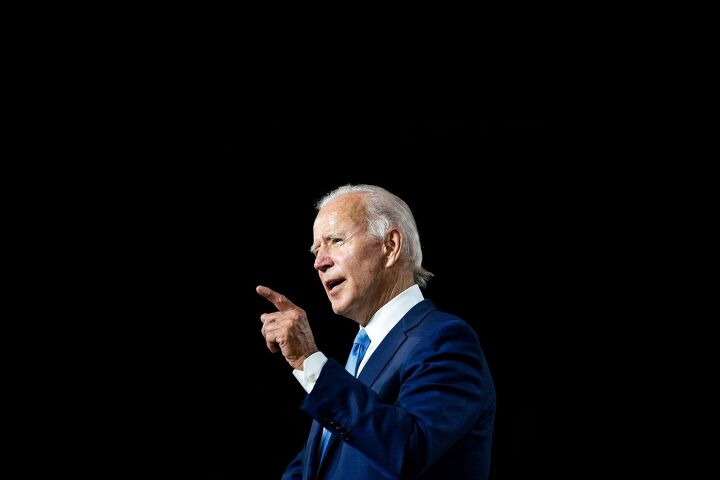Editorial: This Isn’t The Time For Biden’s ‘Buy American’

Two weeks ago, President Joe Biden announced during the State of the Union that federal infrastructure projects will, going forward, be required to use all American-made construction materials. Applause resounded throughout the divided chamber.
And why not? Nobody ever wins an election - especially when it’s not an election year - by promising to buy more foreign-made goods.
But the thinkpieces came from left and right shortly after the echoes dissipated. When the New York Times, The Atlantic, and Reason agree on a topic, it might be worth considering that the subject bears reevaluation. And no, don’t adjust your dial. This is still The Truth About Cars, not The Truth About Concrete - but without roads, most of our cars are useless.
Let me say first something longtime readers may know about me - I don’t write about the auto industry full-time. This is basically a hobby, though an unusual one for which I’m paid. My career for the past two decades has been in some form of industrial and/or wholesale sales. I work with other businesses to help them do whatever they do - by selling either the materials they then sell to their end users, or by selling equipment they use to make their products or perform their services. It’s not a glamorous career, but one for which I seem well suited. And I feel that this gives me a perspective into global trade on a level that's a bit more closely focused than on a macroeconomic scale.
My first concern with any sort of further enforcement of any Buy American standards is within a phrase I’ve sadly had to use a great deal over the past 35 months in both of my careers - supply chain issues. In any sort of business, disrupting the flow of raw materials, finished goods, and labor can be catastrophic. It may create potential opportunities for others - in the auto industry, for example, we found the big used-car chains trying to corner the market on supply due to the constrictions of new car production. Alternative products may succeed over previously-preferred goods when the supply ensures they’ll reach the market. Disrupting a marketplace by restricting the ability to purchase some materials strictly based on point of origin can be yet another factor leading to supply chain issues.
These Buy American rules aren’t new. Indeed, this is simply enforcement of laws that have been on the books since the New Deal was actually new. But enforcement, like anything else, can be politicized. And even then, there are ways around such regulations that look more like money laundering to anyone who enjoys a good gangster flick.
I’ll obfuscate details for reasons that should be obvious, but a decade ago I worked for a business supplying any number of products to both private businesses and to local, state, and federal agencies. The company for which I worked was a large international conglomerate, but one of the larger government agencies to which we sold had to abide by certain purchasing standards meant to encourage buying from small, minority-owned businesses. I’m not here to argue for or against this practice in theory - in reality, however, we found that we were selling a certain percentage of those products to a middleman of sorts. This third party - we always liked to imagine it was just one guy with a laptop and a cellphone sitting on a beach somewhere - would simply process invoices between our company and the government agency, adding a markup for their service of washing the invoice to make it appear as if the product came from the minority-owned business. Instead, taxpayers were paying more for these products simply due to the regulations in place.
Within days of Biden’s State of the Union announcement, it’s not hard to see the irony in the waiver of these Buy American rules when the White House announced the opening of Tesla’s charging network to all EVs as well as the expansion of additional charging stations nationwide. Half a million new chargers are promised. But they don’t need to be American-made.
.
The Atlantic points out that the baby formula shortage in recent years was caused by an American factory having a contamination problem, requiring a shutdown to ensure product safety. The market might have been able to withstand this had restrictions on imported baby formula been lifted - they use the term “friend-shoring” which allows for trade of certain goods with those nations committed to similar quality and safety standards. Indeed, the presence of melamine in Chinese-produced baby formula some years ago was front of my mind as I read through these various statements.
But our own safety and worker protection standards deserve analysis as well. It’s hard to overlook East Palestine, Ohio - a tiny community about three hours east of my home in Central Ohio that has been absolutely devastated due to cascading failures of safety standards, government response, and even Murphy’s Law. Bridges are failing and roads are crumbling, but as long as TikTok and YouTube can stream easily into our homes and workplaces most don’t seem to care.
Our infrastructure is problematic, that’s for certain. It also can’t be denied that ensuring middle-class manufacturing jobs - the careers that allow people to participate in our world without resorting to multiple jobs just to make rent - is critical to strengthen not just our economy but our society.
But raising the costs on state and federal agencies trying to meet these Buy American standards will only pass the costs on to the American taxpayer in one way or another. Whether through increased taxes or reductions in other services, someone’s going to pay - and it’s quite likely going to be that middle-class worker, whether they have a manufacturing job or not.
[Image: Luca Perra/Shutterstock.com]
Become a TTAC insider. Get the latest news, features, TTAC takes, and everything else that gets to the truth about cars first by subscribing to our newsletter.

Some enthusiasts say they were born with gasoline in their veins. Chris Tonn, on the other hand, had rust flakes in his eyes nearly since birth. Living in salty Ohio and being hopelessly addicted to vintage British and Japanese steel will do that to you. His work has appeared in eBay Motors, Hagerty, The Truth About Cars, Reader's Digest, AutoGuide, Family Handyman, and Jalopnik. He is a member of the Midwest Automotive Media Association, and he's currently looking for the safety glasses he just set down somewhere.
More by Chris Tonn
Latest Car Reviews
Read moreLatest Product Reviews
Read moreRecent Comments
- Lorenzo If it's over 30 years old and over 80k miles, and not a classic, it's a parts car, worth no more than 20% of original price.
- Dusterdude No mileage noted on a 33 year old car means likely well north of 300k + miles , along with issues noted , should equate to an ask price of less than $3k
- Ajla IMO, something like this really should be naturally-aspirated.
- Kjhkjlhkjhkljh kljhjkhjklhkjh Unless they are solid state batteries you BAN THEM. I like EVs... but EVs like to burn ... for days
- Kjhkjlhkjhkljh kljhjkhjklhkjh uh .. it looks like a VW golf got the mumps



































Comments
Join the conversation
Chris, are you a substitute for the Thorfinn actor on Ghosts?
It seems to me that your arguments imply better control of what is really "made in America".
Like you, I spent decades in industry, in just about every area , before joining it all together as a management consultant.
My mantra was simple: be careful what you contract for. If you're willing to pay for a document, you'll get a document. If you want proof, though, your document won't be enough.
Companies cut corners. That is the reality of our world. Companies will do the minimum necessary to satisfy you. If a document will satisfy you, that's what you get.
If you want a particular specification, you must figure out how to be sure, every time. A document won't do.